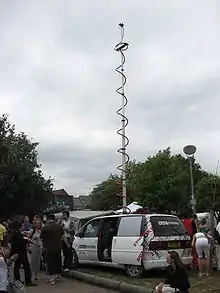BBC Radio Oxford
BBC Radio Oxford is the BBC Local Radio station for Oxfordshire, UK.
 | |
| City | Oxford |
|---|---|
| Broadcast area | Oxfordshire |
| Frequency | 95.2 FM & DAB |
| Slogan | The sound of Oxfordshire, and all the music you love |
| Programming | |
| Language(s) | English |
| Format | Local news, talk and music |
| Ownership | |
| Owner | BBC Local Radio, BBC South |
| History | |
First air date | 29 October 1970 |
| Links | |
| Website | BBC Radio Oxford |
The station broadcasts on 95.2 FM via the Oxford transmitter, on DAB and online, and live from the BBC's Summertown studios in Oxford between 6 a.m. and 10 p.m. each weekday, for over 13 hours on Saturdays and 16 hours on Sundays. It also carries regional programming simulcast with the BBC's local radio stations in the South and South East regions. BBC Radio Oxford also produces its own news service from its offices in Oxford with regular reports and outside broadcasts from around Oxfordshire. The weather service is provided by a team in Southampton.
According to RAJAR, the station has a weekly audience of 61,000 listeners and a 3.8% share as of December 2018.[1]
History

- Early 1970 - Oxford was chosen as a location for BBC local radio and premises in Summertown found at 242-254 Banbury Road. The site is known as Barclay House and was previously a Rolls Royce showroom.
- Mid 1970: Staff were recruited, a small number with BBC experience but mostly local people, and the studios at Summertown are built.
- September 1970 - On air staff trained at The Langham Hotel in London
- Early October 1970 - Three weeks of test transmissions begin.
- 29 October 1970 - BBC Radio Oxford officially begins transmission at 5 pm on 95.0 MHz VHF.
- 31 December 1970 - Radio Times lists BBC Radio Oxford programmes for the first time.
- 5 October 1972 - Due to high demand by residents who did not have VHF/FM on their radios, BBC Radio Oxford begins broadcasting on 202 metres medium wave (1484 kHz). The station would also be available on the local cable network on 'Rediffusion Channel A'.
- 26 June 1973 - BBC Radio Oxford moves its VHF frequency to 95.2 MHz to avoid interference with BBC Radio London on 94.9 MHz.
- 22 May 1976 - The station opens its studios to the public for an open weekend.
- October 1980 - BBC Radio Oxford celebrates 10 years on air by publishing a magazine.
- April/May 1989 - BBC Radio Oxford moves to purpose built studios at 269 Banbury Road, Summertown.
- 9 April 1996 - Radio Oxford merges with BBC Radio Berkshire to form the short-lived BBC Thames Valley FM. Local programming is restricted to separate news bulletins for the two counties.
- 14 February 2000 - Radio Oxford is revived, although most output continues to be shared with Radio Berkshire.
- 2004 - BBC Radio Oxford relaunches with a new line-up of presenters. By now, the station has regained a full line-up of local programming.
- April 2008 - The station is rebranded as BBC Oxford 95.2FM as part of a relaunch involving the regional TV news programme BBC Oxford News (previously South Today Oxford).
- October 2010 - The station celebrates its 40th anniversary and reverts to the Radio Oxford branding.
- 21 December 2012 - BBC Radio Oxford's DAB service is launched.[2][3]
Programming
Most of BBC Radio Oxford's programming is produced and broadcast from its Oxford studios.
During off-peak hours, BBC Radio Oxford also carries regional programming for the South and South East regions, produced from sister stations including BBC Radio Solent and BBC Radio Kent. During the station's downtime, BBC Radio Oxford simulcasts BBC Radio 5 Live overnight.
The station's notable presenters include David Prever
Notable past presenters
|
|
See also
- Oxford University Broadcasting Society (former producer of BBC Oxford programmes)
References
- "RAJAR". RAJAR. Retrieved 27 September 2015.
- The airwaves go digital. thisisoxfordshire. 22 December 2012
- NOW Digital - Oxford. Archived 26 June 2014 at the Wayback Machine Retrieved 5 January 2013